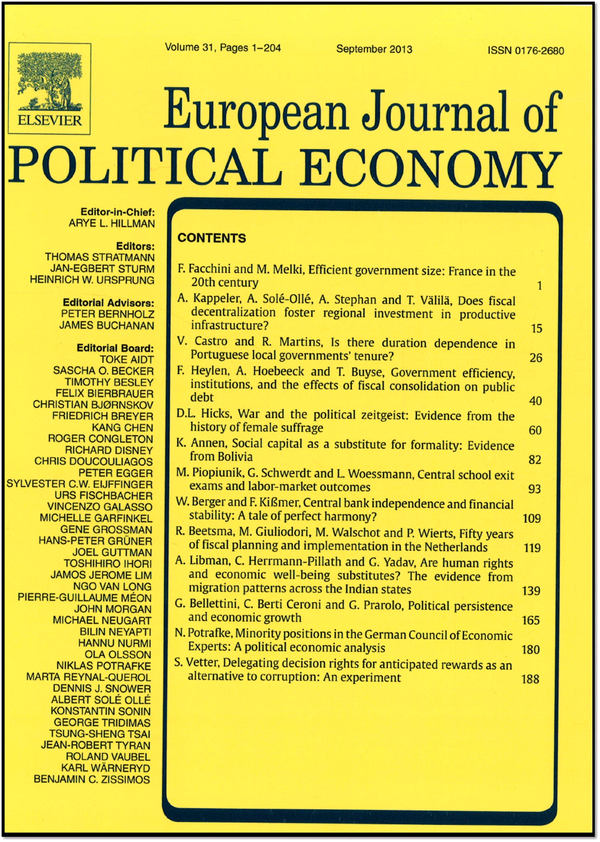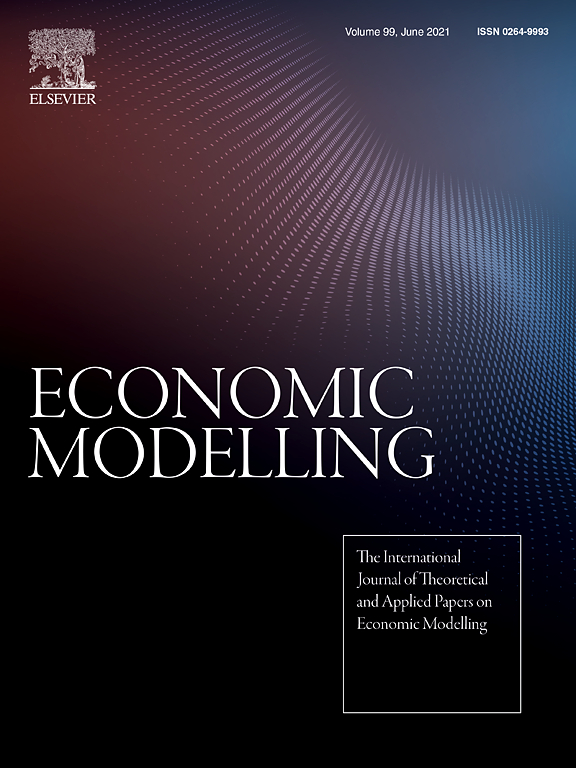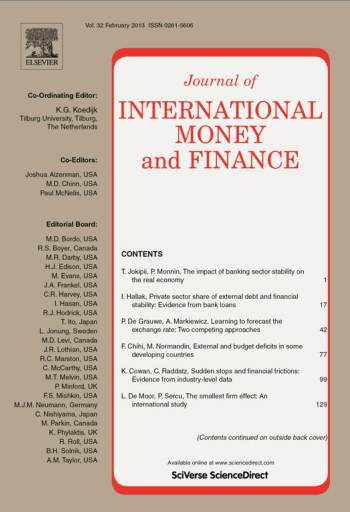Volatility, Growth and Financial Crises
This research group analyses the build-up of financial vulnerabilities and real consequences of financial crises. Different policy shocks and the causal reaction of macroeconomic aggregates are identified. Early-warning models describe the cyclical nature of financial vulnerabilities.
IWH Data Project: Financial Stability Indicators in Europe
Research Cluster
Financial Resilience and RegulationYour contact

Mitglied - Department Macroeconomics
EXTERNAL FUNDING
01.2022 ‐ 12.2023
Sovereign Risk Shocks
Deutsche Bundesbank
05.2017 ‐ 09.2019
Early Warning Models for Systemic Banking Crises: The Effect of Model and Estimation Uncertainty
German Research Foundation (DFG)
01.2018 ‐ 12.2018
International Monetary Policy Transmission
Deutsche Bundesbank
Refereed Publications

Spillover Effects among Financial Institutions: A State-dependent Sensitivity Value-at-Risk Approach
in: Journal of Financial and Quantitative Analysis, No. 3, 2014
Abstract
In this paper, we develop a state-dependent sensitivity value-at-risk (SDSVaR) approach that enables us to quantify the direction, size, and duration of risk spillovers among financial institutions as a function of the state of financial markets (tranquil, normal, and volatile). For four sets of major financial institutions (commercial banks, investment banks, hedge funds, and insurance companies) we show that while small during normal times, equivalent shocks lead to considerable spillover effects in volatile market periods. Commercial banks and, especially, hedge funds appear to play a major role in the transmission of shocks to other financial institutions.

The Impact of Preferences on Early Warning Systems - The Case of the European Commission's Scoreboard
in: European Journal of Political Economy, 2014
Abstract
The European Commission’s Scoreboard of Macroeconomic Imbalances is a rare case of a publicly released early warning system. It allows the preferences of the politicians involved to be analysed with regard to the two potential errors of an early warning system – missing a crisis and issuing a false alarm. These preferences might differ with the institutional setting. Such an analysis is done for the first time in this article for early warning systems in general by using a standard signals approach, including a preference-based optimisation approach, to set thresholds. It is shown that, in general, the thresholds of the Commission’s Scoreboard are set low (resulting in more alarm signals), as compared to a neutral stand. Based on political economy considerations the result could have been expected.

Explosive Preisentwicklung und spekulative Blasen auf Rohstoffmärkten
in: ORDO, No. 64, 2013
Abstract
This paper analyzes whether price developments on commodity markets support the hypothesis that commodity prices are subject to speculative behavior in certain time periods. This is an important research question within the ongoing debate on the regulation of commodity trading. It can be shown that commodity prices occasionally exhibit explosive behavior. In particular, this is found for raw industrials, but also for foodstuff. An important implication is that the reasons and the effects on consumers and investors of bubbles on commodity markets have to be investigated in greater detail. Additionally, the distributional effects of these findings should be analyzed in future research.

Exchange Rate Regime, Real Misalignment and Currency Crises
in: Economic Modelling, No. 34, 2013
Abstract
Based on 69 sample countries, this paper examines the effect of macroeconomic fundamentals on real effective exchange rates (REER) in these sample countries. Using the misalignment of actual REER from its equilibrium level, we have estimated the factors explaining the extent of currency over- or under-valuation. Overall, we find that the higher the flexibility of the currency regime, the lower is the misalignment. The estimates are robust to different sub-samples of countries. We then explore the impact of such misalignment on the probability of a currency crisis in the next period, indicating the extent to which misalignment could be used as a leading indicator of a potential crisis. This paper thus makes a new contribution to the debate on the choice of exchange rate regime by bringing together real exchange rate misalignment and currency crisis literature.

Predicting Financial Crises: The (Statistical) Significance of the Signals Approach
in: Journal of International Money and Finance, No. 35, 2013
Abstract
The signals approach as an early-warning system has been fairly successful in detecting crises, but it has so far failed to gain popularity in the scientific community because it cannot distinguish between randomly achieved in-sample fit and true predictive power. To overcome this obstacle, we test the null hypothesis of no correlation between indicators and crisis probability in three applications of the signals approach to different crisis types. To that end, we propose bootstraps specifically tailored to the characteristics of the respective datasets. We find (1) that previous applications of the signals approach yield economically meaningful results; (2) that composite indicators aggregating information contained in individual indicators add value to the signals approach; and (3) that indicators which are found to be significant in-sample usually perform similarly well out-of-sample.















